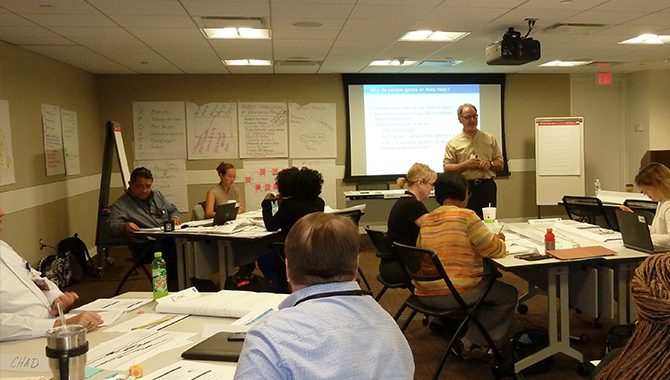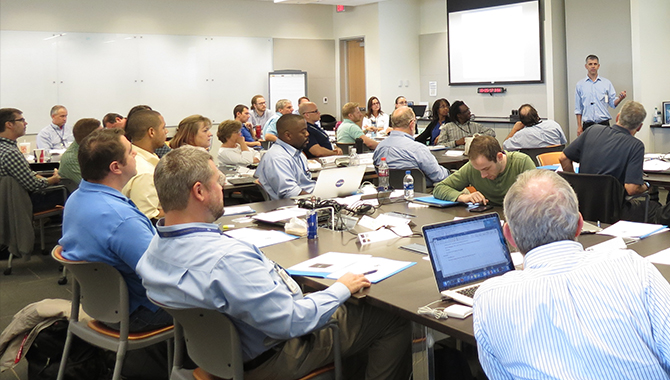
Managers will learn to identify, analyze, and correct problems that threaten project success.
At one point in its development, the Apollo-era Lunar Module was more than 10 months behind schedule as engineers worked through the challenges of designing and building the first crewed space craft that would fly exclusively in space. Apollo 9 Commander James McDivitt recalled “…everything we touched fell off the wall or broke or it did something!”
The troubled Lunar Module project eventually produced one of the most successful spacecrafts in history. Not only did it carry astronauts to the surface of the Moon six times, it was also versatile enough to play an instrumental role in saving Apollo 13 after an explosion jeopardized the mission and the astronauts on board.
Experts consider a project to be troubled when budget or schedule overruns, quality shortfalls, or issues with scope are beyond acceptable limits, endangering the success of a project, but still at levels where the project can be rescued.
APPEL Knowledge Services, the recognized leader in agency-wide training for NASA’s technical workforce, has added a new two-day course—Recovery of Troubled Projects (APPEL-vRTP)—to help experienced project managers identify a troubled project, analyze the contributing factors, and perform corrective actions to get the project back on track.
“The new Recovery of Troubled Projects course is part of our Lessons Learned for Mission Success category. We developed the course to not only encourage the documentation of lessons from troubled projects, but to help program/project managers learn from them and avoid repeating the same mistakes,” said Donna Wilson, APPEL KS’s Curriculum Manager.
Although each troubled project is unique, the course will help experienced project managers identify early warning signs, evaluate their project’s status, and differentiate between a project that is recoverable and one that is not.
The course also helps a project manager develop an executable recovery plan as well as the appropriate leadership and communication techniques to earn team buy-in and get the project moving in the right direction, with appropriate control mechanisms in place to make the progress sustainable.
APPEL piloted the course virtually on September 28-29, receiving positive feedback from attendees.
“This course gets to the heart of understanding and providing a logical thought process in how to recognize and deal with troubled projects. It aids in developing tools that allows one to tease out issues and determine the level of trouble and if the project is recoverable,” one attendee wrote in a course evaluation.
“As a senior engineer and project manager, I have had significant experience in reviewing and assessing troubled projects. This class helped me revalidate and improve my skills and knowledge for future initiatives,” another attendee wrote.
“I will be able to identify when a project is troubled and have a few tools at my disposal to help the project recover. For example, the 5y’s technique helps identify the root cause of the project steering off track,” another attendee wrote. “This technique is simple but effective and helps to identify actionable indicators of project deterioration. In addition, techniques such as earned value management, frequent risk assessment, and customized stakeholder communication patterns/platforms can be applied to help maximize the efficiency/effectiveness of the project recovery plan.”
The Recovery of Troubled Projects (APPEL-RTP) course is scheduled for February 17-18, 2021, in the eastern time zone. Seating is capped at 30 attendees. Registration is now open.
A high-performance team can help a manager recover a troubled project or avoid one in the first place. APPEL will present a new 2-day pilot course, Tactical Skills for Creating High Performance Teams (APPEL-CHPT) on January 14-15, 2021 in the central time zone. Attendance is capped at 20 for this pilot.
High-performance teams are essential for success in NASA projects, which often push the boundaries of science, technology, and engineering. This course will help managers understand how to create an innovative, collaborative, empowered team to effectively navigate the natural uncertainty associated with systems development.
A learning and open culture is key to embracing “Risk Leadership” principles and enabling the “decision velocity” necessary to deliver mission success in the rapidly changing environment of the modern aerospace industry, with its mix of commercial and international partners.
The course will cover the leadership techniques needed to establish a collaborative environment, which can foster innovative thinking and empower creative team solutions. Managers will also learn how to identify and mitigate any factors or unconscious biases that could inhibit a team’s success.
“Our new Tactical Skills for High Performance Teams course is meant to equip program/project managers with the skills to better solve problems and deliver quality results. We believe both of these courses support mission success,” Wilson said.









